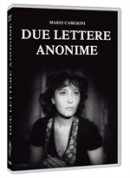| Two Anonymous Letters | |
|---|---|
 DVD cover | |
| Directed by | Mario Camerini |
| Produced by | Carlo Ponti |
| Cinematography | Massimo Terzano |
| Music by | Alessandro Cicognini |
Release date |
|
| Country | Italy |
| Language | Italian |
Due lettere anonime, internationally released as Two Anonymous Letters, is a 1945 Italian war- melodrama film directed by Mario Camerini. [1]
Contents
For this film Andrea Checchi won a Silver Ribbon for Best Actor. [2]